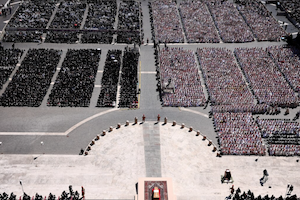Pope Francis' Funeral Held at Noon on April 26: 250,000 Mourners and Leaders from 170 Nations Attend

Pope Francis' funeral was held on Saturday, April 26, 2025, in St. Peter’s Square at the Vatican, drawing leaders and faithful from around the world. It became one of the largest papal funerals in the past two decades.
Delegations from over 150 countries attended the ceremony, including 50 heads of state and 10 reigning monarchs. Among those present to pay their respects were U.S. President Donald Trump, French President Emmanuel Macron, Ukrainian President Volodymyr Zelensky, Argentine President Javier Milei, and Prince William of the United Kingdom. Due to the Vatican’s seating arrangement based on the French alphabetical order, President Trump was seated in the third row, apart from President Zelensky.
Pope Francis passed away on April 21 due to a stroke and heart failure at the age of 88. In the three days prior to the funeral, approximately 250,000 faithful visited St. Peter’s Basilica to view his body. The funeral Mass, lasting about 90 minutes, was presided over by Cardinal Giovanni Battista Re. The ceremony was simple and solemn, in keeping with Pope Francis’ lifelong commitment to humility and service.
Unlike previous popes, Pope Francis chose to be buried in the Basilica of Saint Mary Major in Rome, a place he frequently visited for prayer. He was laid to rest in a simple wooden coffin, engraved only with the Latin name "Franciscus," reflecting his dedication to a modest lifestyle.
To accommodate the massive crowds and high-profile guests, around 8,000 security personnel were deployed by the Vatican and Rome authorities. Anti-drone systems, snipers, fighter jets, and naval forces were also on standby to ensure safety. The funeral took place during the Catholic Jubilee Year, which brought various infrastructure upgrades in Rome that helped manage the flow of people and traffic.
Pope Francis was the first non-European pontiff in nearly 800 years. During his papacy, he pushed for Church reform and emphasized care for the poor, migrants, and the environment, promoting humility and inclusivity. Despite resistance from conservative factions, he remained committed to modernizing the Church. With his passing, the Vatican will convene a conclave after May 6 to elect the next pope, a decision watched closely by Catholics and global observers alike.
- 29 reads
Human Rights
Fostering a More Humane World: The 28th Eurasian Economic Summi

Conscience, Hope, and Action: Keys to Global Peace and Sustainability

Ringing FOWPAL’s Peace Bell for the World:Nobel Peace Prize Laureates’ Visions and Actions

Protecting the World’s Cultural Diversity for a Sustainable Future

Puppet Show I International Friendship Day 2020

